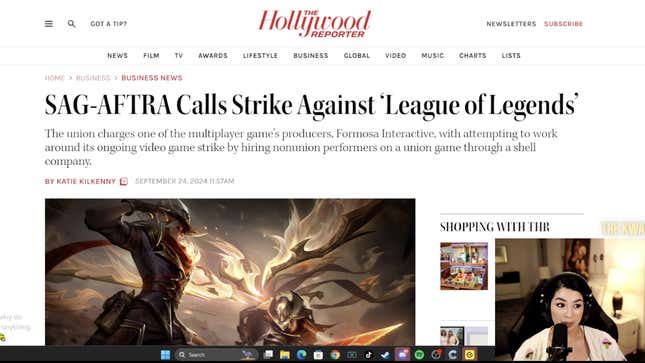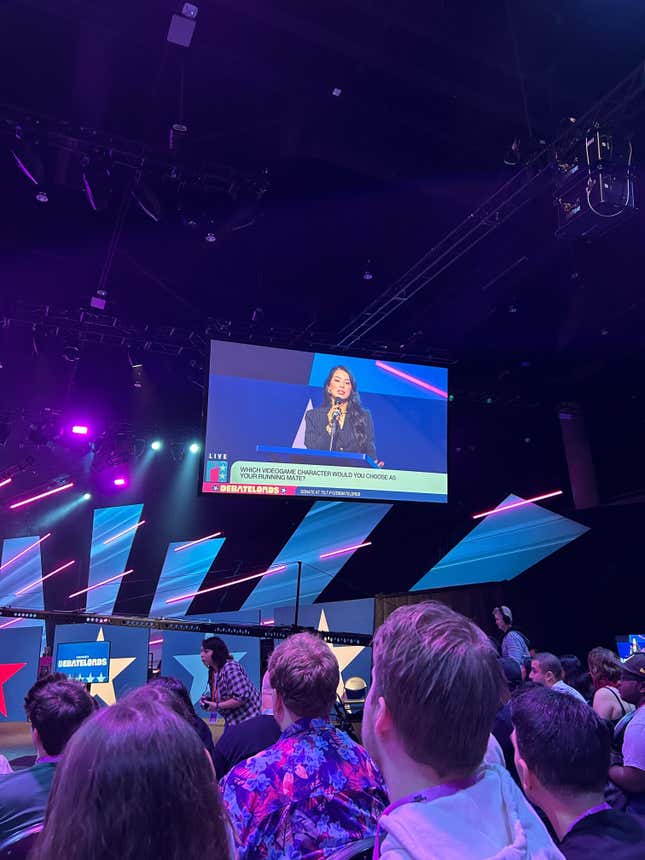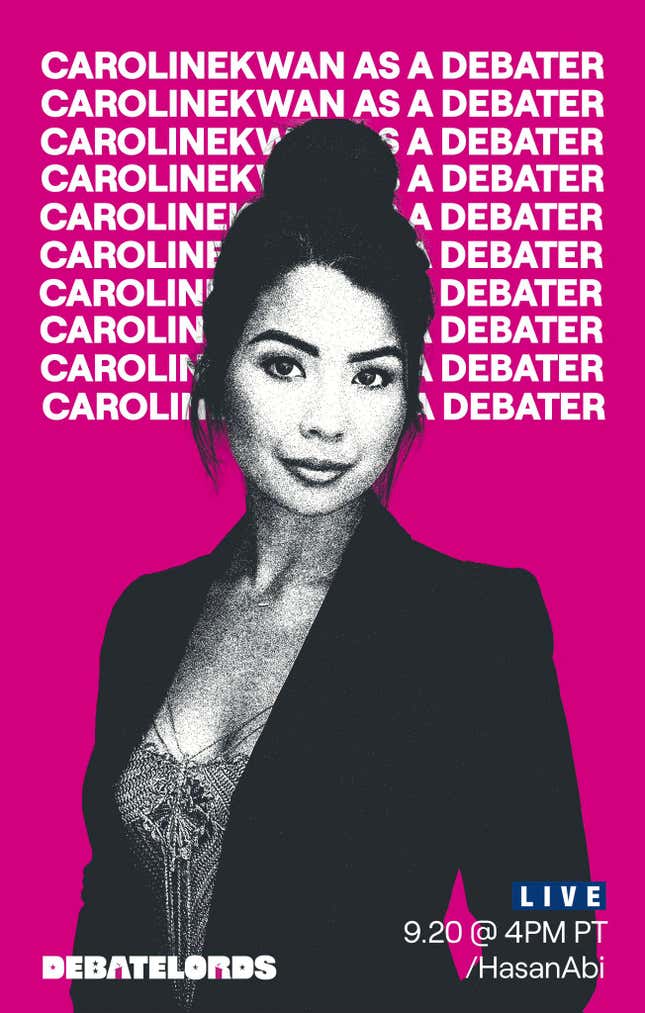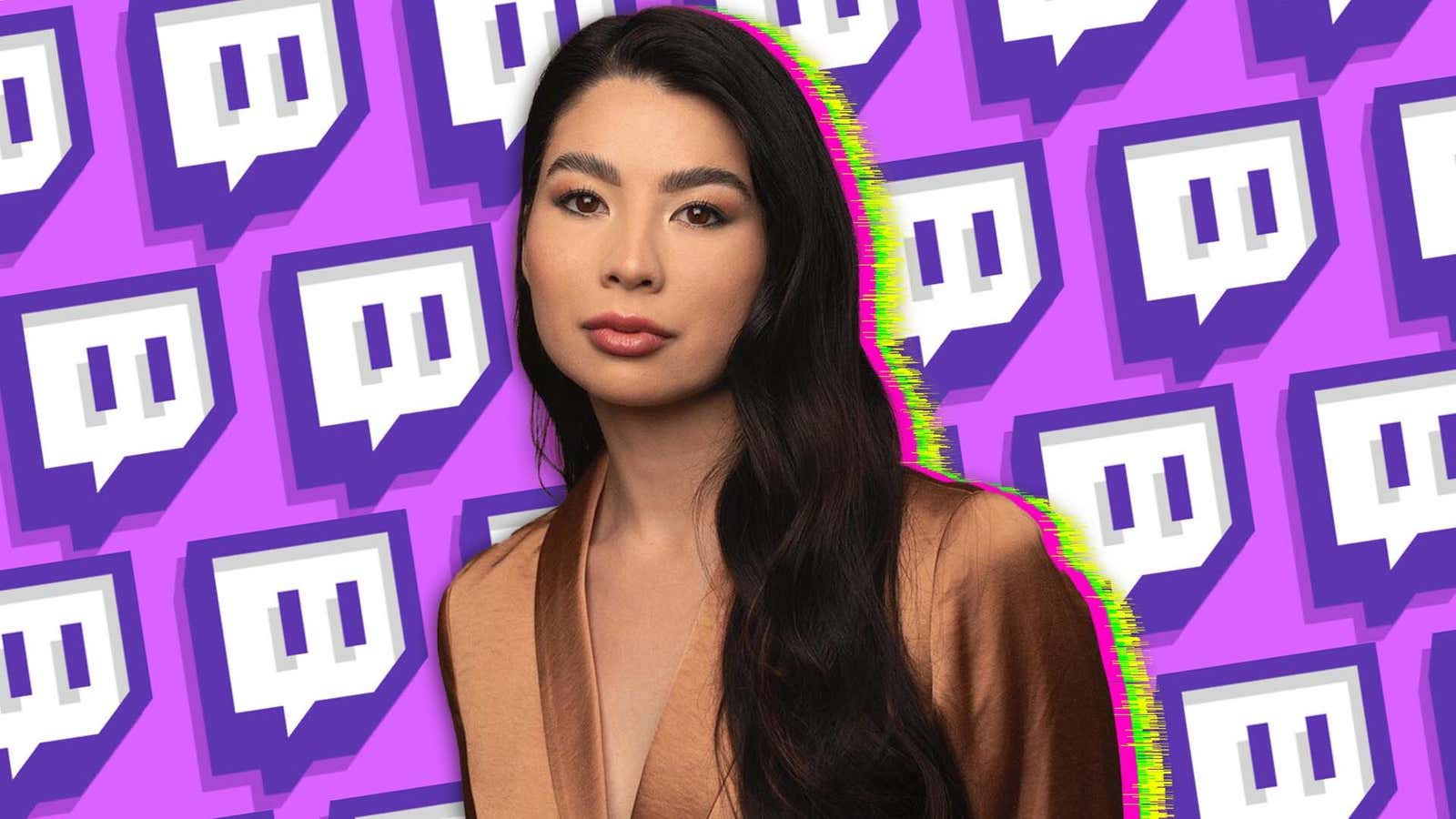Caroline Kwan is tired, but you can’t tell. The political fundraiser turned actor turned Twitch streamer is sitting across from me in a TwitchCon meeting room on the last day of the convention, wearing a pink boilersuit and sneakers, her hair pulled back off her face, looking clear-eyed and alert.
“This year was like, oh my god. Day one: Debatelords rehearsal, meet and greet, back to Debatelords for the show, afterwards business dinner. It’s a lot,” she exhales.
“I told my community I’d try to stream on Saturday, I’ll try to stream on Sunday, and then I realized I don’t like streaming at TwitchCon,” she admits. Her community is an impressive one: 134,000 strong, all there for Kwan’s rather specific streams that blend pop culture and politics delivered with sharp humor and even sharper commentary. Caroline Kwan is a force, both in-person and on-stream.
The Caroline Kwan method
Kwan leverages her rather unique background for her Twitch streams, covering major pop culture events like the Oscars and Emmys and weaving political and historical context into her commentary. Though she’s in the inner circle of streamer royalty like Hasan “Hasanabi” Piker, AustinShow, QTCinderella, and Will Neff (the latter of whom is her partner), Kwan has forged her own path.
“When I started streaming, I didn’t wanna get pigeonholed into politics because of my proximity to Hasan you know, personally, having known him a long time and dating Will,” she says. “I don’t want this to be a ‘oh female Hasan’ thing…I wanted to have something that like no one else was doing on Twitch as well, which is why I leaned heavily into pop culture, and specifically where pop culture and politics intersect.”
That intersection is perfectly encapsulated in Kwan’s coverage of the 2023 Writers Guild of America strike. “I’m a member of SAG [Screen Actors Guild] and WGA, and when the strikes were happening that was my first year streaming, so I was out there on the picket lines,” she explains. “I was covering them every day, explaining to people how this is about labor. I know it’s Hollywood and people think it’s just celebrities who want more money. But most people in these unions are not rich. They’re probably making about what you make, and they can’t afford their healthcare coverage…And they deserve better working conditions, better pay…and so that was in my first year of streaming and that was the thing that helped really define my content.”
Though Kwan’s “bread and butter” are her awards show streams, she still injects politics and cultural commentary into her coverage. “I talk a lot about representation, I talk about the impact that film has on society…how in the wake of 9/11 there was an influx of even more anti-Muslim depictions—like everyone in the Middle East is terrorists,” she says. “That’s used to affect people in the United States, how they feel about what their government is doing over there. Literally, the Department of Defense has an entertainment bureau that they started after World War II.”
I mention Call of Duty, and how games like it similarly influence people’s opinions on the Middle East. She nods. “So much of pop culture is propaganda. Some of it’s very subtle. Some of it’s not so subtle,” she explains. “So it’s about identifying when something is propaganda. Like I always say, ‘look, I’m not saying that you can’t enjoy a TV show where it’s clearly very pro-cop or something, you just need to recognize that, right?’ Just understand when you’re being influenced by popular media.”

The price of being a woman online
Naturally, our conversation turns towards the pressures of being a woman in such a male-dominated space, and the kinds of negativity she faces just by going live on Twitch.

“Being a woman online, just simply existing online, puts a target on your back, which is why something like AI deepfakes primarily targets women,” she says, referencing the Twitch deepfake porn scandal of last year, in which a prominent streamer accidentally revealed he was watching doctored porn featuring his peers’ likenesses while live.
“Here’s just an example of how misogyny is at the core of deepfakes. When I tweeted about [the scandal] I got DMs and comments saying, ‘you’re next, we’ll come for you next,’” Kwan explains. “Just simply because I said ‘this is not right. Do not do this. Women are not consenting to this.’ Then I had the lasers put on me because it’s about power. It’s about control. That is what sexual abuse of women is about. And AI deepfakes are digital sexual abuse.”
For several minutes, Kwan and I go back and forth exchanging horror stories about the DMs and comments we’ve both received, and how they are steeped in the tired misogyny of the internet, of GamerGate, of angry young men. “Sometimes someone comes into chat [to be mean] and I’ll go ‘look, if you’re gonna try to insult me, be creative with it,’” she says as I laugh. “Please don’t just come in and do the same boring ass shit that I’ve been hearing since elementary school…get new material.”
I ask her about the added pressure to depict perfection that so many women, queer folks, and POC feel in online spaces. She nods emphatically. “As somebody who already has struggled with [perfection] for a long time—I wonder too, does this come from just me being a half Asian girl growing up in primarily a white suburb? That it’s been ingrained in me that you need to always have it right? Because there are always eyes on you, there’s always a spotlight on you and you must be perfect.”
But that fear of not being perfect, which Kwan says she imposed upon herself at a young age, isn’t enough to get her to stop talking. “I realized pretty early on that I cannot help but to speak. I must speak—were you silent or were you silenced? Neither!” We laugh loudly at her Oprah meme reference.

“And then streaming comes into the picture and it’s live, there’s no editing, it’s happening in real time…and as attention started to be put on me, I also got the bad attention too…and [the bad actors] scrutinize everything, they clip you out of context, they will say ‘oh you’re a dumb bitch,’” she says. “It doesn’t matter how much care I put into my streams. It doesn’t matter how I talk openly…I don’t know every single thing. I make mistakes, we all make mistakes. It’s what you do when you make a mistake that I think is more illuminating of who you are as a person.”
She tells me that the younger members of her community have taught her so much, and that she always tries to put the focus on marginalized folks who are directly affected by the issues she covers on stream. As we near the end of our conversation (which was by far my most enlightening one of the weekend), we both kind of sigh, sinking into the realization that we are two women fighting against a seemingly ceaseless current of hate.
“There’s not, there’s not a lot of female streamers who do what, like, [political streamer] Denims and I do with the majority of our content. And I understand why. It’s a difficult situation because I wish more women could speak up because there’s power and strength in numbers—you’ve got every dumbfuck dude out here who will give their opinion on something…and they have these massive audiences,” Kwan spits. “And with women, because of the obstacles that we face of simply just being online, being public figures, there are a lot of women who have just decided not to give their opinions—and I totally understand! It sucks!”
She thinks for a second, clearly ruminating on her impact as such a high-profile streamer who isn’t white and isn’t a man.
“I started streaming to create a community, to have a platform, to be able to share my voice and to advocate for things that I care about that I think are important—and to try and be a good example on this platform,” she pauses. “On a positive note, for all of the obstacles and the challenges that we’ve talked about here, I look at my community and I look at how quickly I have grown on Twitch. I’ve been doing this for two years…And the fact that I have something really great and growing all the time, separate from the people who I’m closely associated with, is a sign that what I have to say and what I’m doing on Twitch resonates with people.”
.
